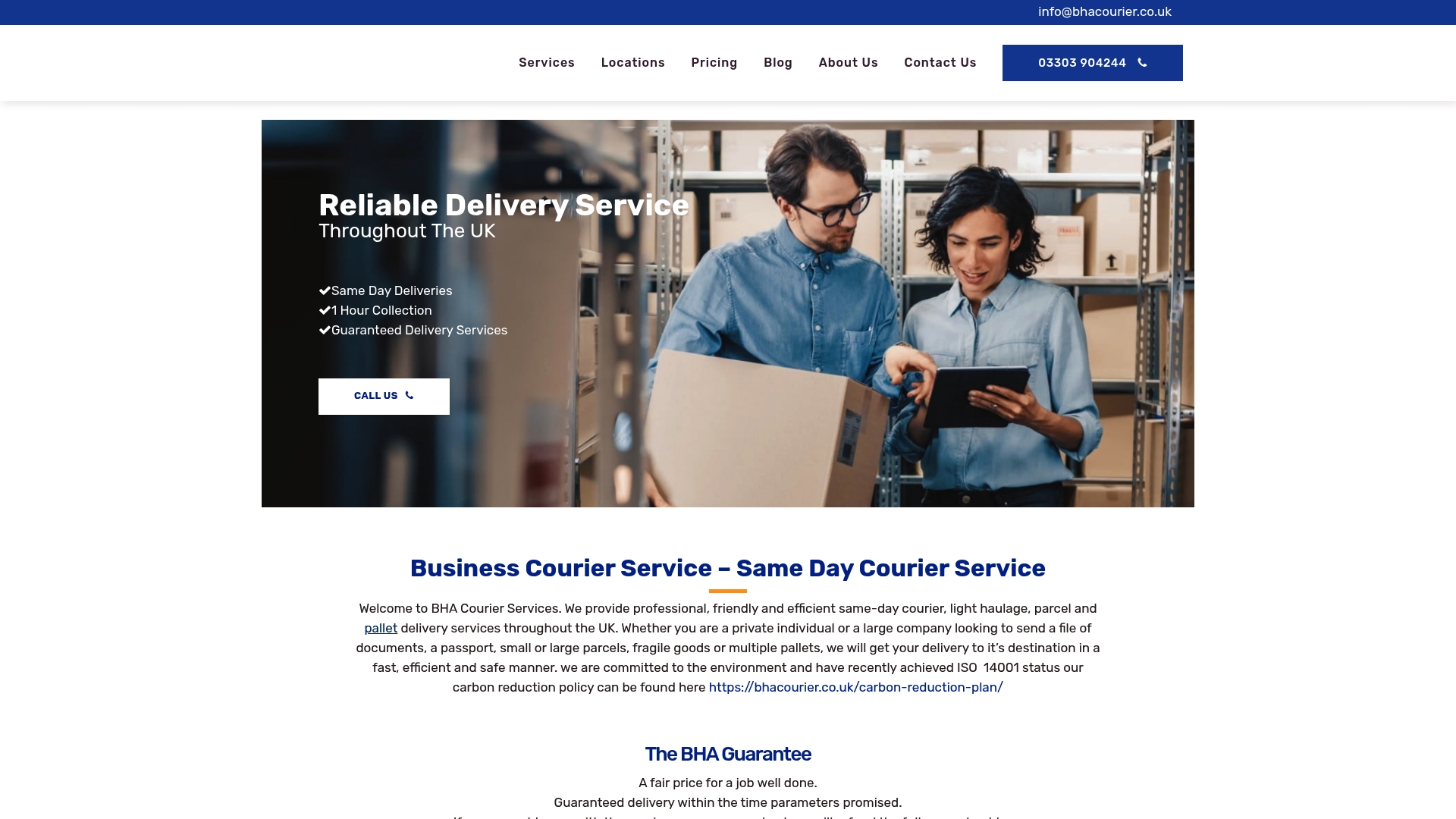
18 Jul What Is Logistics Outsourcing? Guide for UK Businesses 2025

Logistics outsourcing is shaking up the way UK businesses handle supply chains and deliveries. Some companies have managed to cut logistics costs by up to 15 percent just by moving these tasks to specialists. Most people expect the savings to be the main story. Actually, the real win is how fast organisations can adapt and grow when experts handle the tricky work in the background.
Table of Contents
- Understanding What Is Logistics Outsourcing
- Key Benefits For UK Businesses And Individuals
- Types Of Logistics Outsourcing And Service Models
- How To Choose The Right Logistics Partner In 2025
Quick Summary
| Takeaway | Explanation |
|---|---|
| Logistics Outsourcing Streamlines Operations | By outsourcing logistics functions, businesses can focus on core capabilities while reducing costs associated with infrastructure and technology investments. |
| Access to Expertise and Technology | Partnering with specialised logistics providers grants businesses access to advanced technologies and industry expertise, enhancing operational performance. |
| Strategic Flexibility and Agility | Logistics outsourcing allows companies to rapidly adjust their logistics capabilities in response to market demands, promoting competitive advantage. |
| Importance of Comprehensive Partner Evaluation | Selecting the right logistics partner involves assessing reliability, technological capabilities, and adaptability to align with business objectives. |
| Diverse Outsourcing Models Available | Organisations can choose from various logistics outsourcing models, including transactional, tactical, and strategic partnerships, tailored to their operational needs. |
Understanding What Is Logistics Outsourcing
Logistics outsourcing represents a strategic business approach where companies transfer specific logistics and supply chain functions to external specialist providers. This practice enables organisations to streamline operations, reduce costs, and focus on their core business capabilities.

The Core Definition of Logistics Outsourcing
At its fundamental level, logistics outsourcing involves delegating logistics-related tasks and responsibilities to third-party service providers. According to a systematic literature review, this process encompasses transferring internal tasks and decision-making duties to external experts who specialise in logistics management.
Businesses typically outsource various logistics functions, which may include:
- Transportation management: Coordinating and executing freight movements
- Warehousing: Storage, inventory control, and stock management
- Distribution services: Delivering products to end customers
- Supply chain planning: Optimising logistics networks and strategies
Strategic Benefits of Logistics Outsourcing
Companies choose logistics outsourcing for multiple compelling reasons. Research from logistics management studies indicates that organisations can achieve significant operational advantages through strategic outsourcing.
Key strategic benefits include:
- Cost reduction: Eliminating substantial infrastructure and technology investments
- Expertise access: Leveraging specialised knowledge and advanced technological capabilities
- Operational flexibility: Scaling logistics operations quickly without internal resource constraints
- Performance improvement: Utilising providers with proven track records and industry best practices
Implementing Logistics Outsourcing Successfully
Successful logistics outsourcing requires careful planning and collaboration. As highlighted in ‘New Dimensions in the Study of Outsourcing Logistics Services’, companies must thoroughly evaluate potential service providers, establish clear performance metrics, and maintain robust communication channels.
Critical implementation considerations include:
- Conducting comprehensive provider assessments
- Defining precise service level agreements
- Establishing transparent performance monitoring mechanisms
- Maintaining collaborative partnerships with logistics service providers
By understanding logistics outsourcing’s fundamental principles and strategic potential, businesses can make informed decisions that enhance operational efficiency and competitive positioning in an increasingly complex global marketplace.
Key Benefits for UK Businesses and Individuals
Logistics outsourcing offers transformative advantages for UK businesses and individuals seeking efficient, cost-effective transportation and supply chain solutions. By strategically partnering with external logistics providers, organisations can unlock significant operational improvements and competitive advantages.
Economic and Operational Advantages
The economic landscape of modern business demands agile and intelligent logistics strategies. According to the National Academies of Sciences, Engineering, and Medicine, outsourcing logistics enables businesses to leverage external expertise while reducing capital commitments and adapting to dynamic market demands.
Key economic benefits include:
- Capital preservation: Eliminating substantial infrastructure investments
- Scalability: Rapidly adjusting logistics capabilities without significant internal restructuring
- Risk mitigation: Transferring complex logistical challenges to specialised professionals
- Cost efficiency: Reducing overhead expenses associated with maintaining dedicated logistics departments
Enhanced Operational Performance

Outsourcing logistics functions provides businesses with access to advanced technological capabilities and specialised knowledge. By partnering with professional logistics providers, companies can focus on their core competencies while ensuring smooth, efficient supply chain management.
Operational performance enhancements encompass:
- Technology integration: Accessing cutting-edge tracking and management systems
- Expert management: Benefiting from industry-specific logistics expertise
- Global connectivity: Expanding distribution networks beyond local limitations
- Continuous improvement: Implementing best practices from experienced service providers
Strategic Flexibility for Modern Enterprises
For UK businesses navigating increasingly complex market environments, logistics outsourcing provides strategic flexibility. Learn more about our specialised courier solutions that can help businesses adapt quickly to changing operational requirements.
Strategic benefits include:
- Rapid market responsiveness: Quickly adjusting logistics capabilities
- Performance optimization: Continuous refinement of supply chain processes
- Resource allocation: Redirecting internal resources towards core business growth
- Competitive advantage: Maintaining operational agility in dynamic market conditions
By understanding and leveraging logistics outsourcing, UK businesses and individuals can transform their operational approach, achieving greater efficiency, reduced costs, and enhanced competitive positioning in an increasingly complex global marketplace.
Types of Logistics Outsourcing and Service Models
Logistics outsourcing encompasses diverse service models designed to meet varying business requirements. Understanding these different approaches enables organisations to select the most appropriate strategy for their specific operational needs and strategic objectives.
To help you quickly compare the different logistics outsourcing models discussed, the table below summarises their key features and services:
| Model Type | Key Features | Example Services Provided |
|---|---|---|
| Transactional Outsourcing | Discrete task-based, short-term | Shipping, transportation management, warehousing, order processing |
| Tactical Outsourcing | Process-focused, more comprehensive than transactional | Inventory tracking, broader segment management |
| Strategic Partnerships | Long-term, integrated, collaborative | End-to-end supply chain management, strategic planning |
| Fourth-Party Logistics (4PL) | Complete supply chain orchestration, consultative | Network design, technology management, analytics, optimisation |
Transactional and Tactical Outsourcing Models
Peer-reviewed research identifies key categories of logistics outsourcing that businesses can leverage. Transactional outsourcing represents the most basic model, where companies delegate specific, discrete logistics tasks to external providers.
Transactional outsourcing typically involves:
- Shipping and transportation management
- Warehousing services
- Order processing
- Inventory tracking
Tactical outsourcing takes a more comprehensive approach, encompassing entire process segments within the logistics ecosystem. This model allows businesses to transfer more complex operational functions to specialised service providers, creating greater operational efficiency.
Strategic and Comprehensive Logistics Partnerships
Strategic logistics outsourcing represents the most advanced service model, involving comprehensive supply chain management and long-term collaborative partnerships. These arrangements go beyond traditional service provisions, creating integrated solutions that fundamentally transform business logistics capabilities.
Key characteristics of strategic logistics outsourcing include:
- End-to-end supply chain management
- Advanced technological integration
- Collaborative strategic planning
- Performance-driven continuous improvement
Fourth-Party Logistics (4PL) Service Models
Fourth-party logistics (4PL) represents the pinnacle of logistics outsourcing sophistication. Learn more about our comprehensive logistics solutions that can help businesses transform their supply chain strategies.
4PL providers offer comprehensive services that encompass:
- Complete supply chain orchestration
- Technology and information management
- Strategic consulting
- Network design and optimization
- Comprehensive performance analytics
These advanced service models enable businesses to access specialised expertise, cutting-edge technologies, and flexible logistics solutions. By carefully selecting the appropriate outsourcing approach, organisations can develop robust, efficient, and adaptable supply chain strategies that drive competitive advantage and operational excellence.
The evolution of logistics outsourcing reflects the increasing complexity of global business environments, demanding more sophisticated, integrated, and technology-driven approaches to supply chain management.
How to Choose the Right Logistics Partner in 2025
Selecting the right logistics partner represents a critical strategic decision for businesses in 2025, requiring a comprehensive and nuanced approach to evaluating potential service providers. The evolving logistics landscape demands a methodical selection process that goes beyond traditional assessment criteria.
To provide a clear overview of the evaluation and selection process for logistics partners, the following table summarises key criteria and recommended steps based on research findings:
| Selection Step / Criteria | Description |
|---|---|
| Needs Assessment | Define your logistics requirements clearly |
| Market Research | Identify providers with relevant sector expertise |
| Capability Evaluation | Assess technology, operations, and adaptability |
| Performance Benchmarking | Compare against industry standards and competitors |
| Partnership Development | Establish communication frameworks and performance metrics |
| Technological Capabilities | Evaluate provider’s use of advanced logistics systems |
| Reliability & Responsiveness | Consider track record, consistency, and ability to respond to needs |
| Cost Effectiveness | Ensure transparent, competitive, value-based pricing |
| Sustainability & Innovation | Examine commitment to environmental standards and future-ready technologies |
Comprehensive Evaluation Criteria
Research published in the RMUTSB Academic Journal highlights six fundamental criteria for assessing logistics partners: reliability, assurance, tangibility, empathy, responsiveness, and service cost. These dimensions provide a structured framework for comprehensive partner evaluation.
Key evaluation dimensions include:
- Technological capabilities: Advanced tracking and management systems
- Operational reliability: Consistent performance and delivery standards
- Cost effectiveness: Transparent and competitive pricing structures
- Adaptability: Flexibility to meet changing business requirements
- Industry expertise: Proven track record in specific sector requirements
Strategic Selection Methodology
According to Management Research News, selecting an effective third-party logistics provider involves a systematic five-step approach. This methodology ensures businesses make informed, strategic decisions aligned with their operational objectives.
Recommended selection steps:
- Comprehensive needs assessment: Clearly define internal logistics requirements
- Market research: Identify potential providers with relevant expertise
- Detailed capability evaluation: Assess technological and operational capabilities
- Performance benchmarking: Compare potential partners against industry standards
- Collaborative partnership development: Establish clear communication and performance metrics
Future-Oriented Partner Selection
The International Conference on Economics, Finance and Statistics research introduces an integrated approach for logistics partner selection, emphasizing the importance of understanding complex interrelationships between selection criteria.
Learn more about our comprehensive logistics solutions that can help businesses navigate complex partner selection processes.
Critical future-focused selection considerations:
- Technological innovation: Providers demonstrating commitment to emerging technologies
- Sustainability practices: Environmental and social responsibility commitments
- Scalability: Capacity to support business growth and expansion
- Global network capabilities: Comprehensive international logistics infrastructure
- Digital transformation readiness: Advanced digital integration and data management
In 2025, choosing a logistics partner transcends traditional transactional relationships. Successful partnerships will be characterized by strategic alignment, technological synergy, and a shared vision for operational excellence. Businesses must approach partner selection as a collaborative, forward-looking process that supports long-term strategic objectives and drives competitive advantage in an increasingly complex global marketplace.
Frequently Asked Questions
What is logistics outsourcing?
Logistics outsourcing involves transferring specific logistics and supply chain functions to external specialist providers, enabling businesses to streamline their operations and focus on core competencies.
What are the benefits of logistics outsourcing for UK businesses?
UK businesses can benefit from cost reduction, access to specialised expertise, improved operational performance, and increased strategic flexibility by outsourcing logistics functions.
How do I choose the right logistics partner?
Selecting the right logistics partner requires a comprehensive evaluation of providers based on technology capabilities, reliability, cost-effectiveness, and alignment with your business needs. It’s essential to conduct thorough market research and performance benchmarking.
What types of logistics outsourcing models are available?
Various logistics outsourcing models include transactional outsourcing, tactical outsourcing, strategic partnerships, and fourth-party logistics (4PL), each catering to different operational needs and long-term goals.
Ready for Effortless Logistics? Discover Courier Solutions Built for UK Businesses
If reading about logistics outsourcing has made you realise just how much time, money and worry you lose every day to inefficient shipping and unreliable partners, you are not alone. Many UK companies struggle to keep pace with last-minute changes, urgent deliveries and the pressure to meet rising customer expectations. The article’s focus on cost reduction, agility and partnering with specialists proves just how valuable these improvements can be when you trust an experienced provider.

Take control of your supply chain and focus on what matters. With BHA Courier, you access rapid same-day and next-day delivery, secure transport for sensitive items, and nationwide reliability at a moment’s notice. If you want to free your business from logistical headaches today, book your trusted courier service now and see how easy streamlined operations can be.
Recommended
- Same Day Courier Luton – BHA Couriers
- Same Day Bristol Courier – Guaranteed – BHA Couriers
- Same Day Courier London – BHA Couriers
- Light Haulage Services – UK-Wide Delivery – BHA Couriers
- 7 Steps to Waste Compliance for UK Businesses in 2025 – Venture Waste
- How Removals Companies Work: Essential Guide for UK Moves 2025 | Schott Removals


